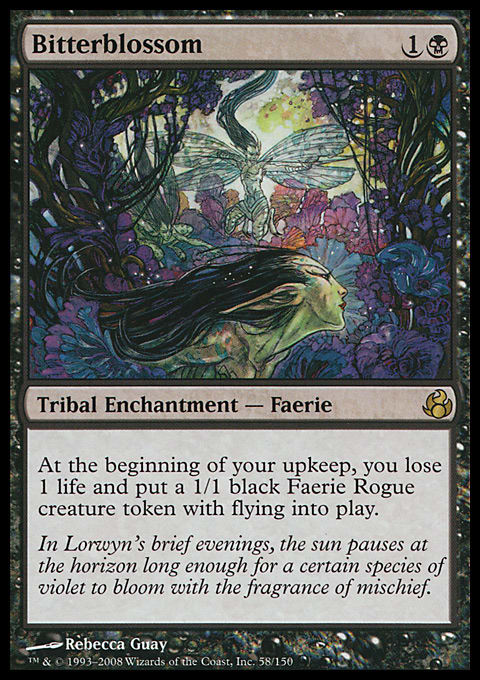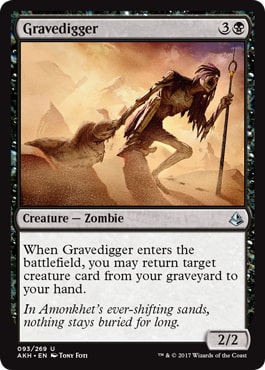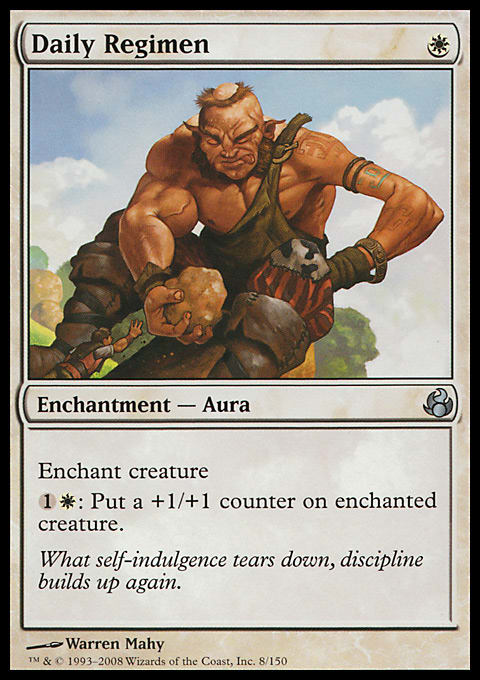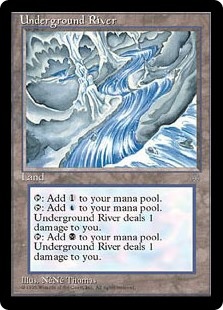It's funny how some losses stick with us. How they hurt.
Perhaps it's because of my perception of what "should" have happened in the above match that my memory has so held onto it. You know, because my opponent didn't "get" Bitterblossom and should never ever (!!) have beaten me.
I'm not one to share bad beat stories - what boring self-indulgent tournament yarns we weave, snoozing our car-mates and colleagues with the real life equivalent of filibustering the details of a Skyrim character, an entity for which no one but the creator could possibly find interesting - so I'll make this quick:
It was the only tournament for which I was willing to play Faeries. I played Grixis Faeries, an archetype which had gone Grixis (up from Dimir) to accommodate a recent Lightning Bolt printing. I had refused the archetype up to that point on the basis that it wasn't an archetype to help me grow as a player, and the events I played at the time were low enough on prestige to where I didn't feel obligated to work on a deck that I felt would only benefit me in the immediate short term.
Tip: There's a strange phenomenon at local events where players try to win all the time, no matter what. I don't understand the nature of this time investment. If you're established among your local scene and there are only a few packs on the line, wouldn't you be better served picking up and practicing a difficult deck rather than running the tables and proving what you've already proven by winning with a deck you already know intimately? For the seventh or eighth week in a row? It very much makes sense if all your goals involve success at very local levels, but many big tournament wins are at least partially built on small tournament losses; don't be afraid to hobble yourself now in order to get an advantage later when your quality of play matters more.
Anyway, I don't remember the nature of the Bitterblossom match other than I kept greedy hands because my opponent was a loss-heavy, lucky eight seed, and I was undefeated.
I died to Nightsky Mimic triggers, resolved Deathbringer Lieges, and yes, my own Bitterblossom.
Pain.
Pain See-ers
One of the first big lessons learned by aspiring players is in regard to life points. Put simply, put generally: New players think their life total is some sort of score, whereby the more you have, the better you're doing; established players know the truth is much more binary: you're either alive or dead, and the number is mostly meaningless beyond the other things that are already shaping the game in a more immediate way.
We Magic kin are a macabre bunch of Goblins. We don't merely say we're no longer in contention for Top 8; we're dead for it. We don't just donate games or give them away, either! No, we "punt" them; we imagine ourselves taking the idea of us winning, game all wrapped up, putting it into a sloppy but emphatic little ball of nothing, and then kicking it skyward away from us as far as we possibly can.
We also categorize pain in some interesting ways, do we not? Not Magic players per se. Just people.
There's emotional turmoil and grief, there's existential pain, there's trauma, there's the visceral fear of the pain involved in gore or death or horror; no matter the genus entailed by my least favorite four-letter word, it's safe to say that most of us spend some significant amount of our time in pain - some of us perhaps on a daily basis.
What's so interesting about the phenomenon to me is that people seek it out. Whether through self-loathing, unresolved emotional entanglement, anger in need of expression, or niche sexual deviancy, there is much to be said about the benefits of something that most of us like to avoid as often as we can get away with. Otherwise, why do it? Otherwise, why does it even exist? Why pain at all?
Pain All the Time
My good friend, Dennis, is a power lifter. He does this voluntarily. He spends hours at the gym every day with his trainer, destroying his muscle tissues on purpose in order to get stronger.
Recently, he failed to fully perform a very advanced lift with very advanced weight. He was able to lift it later on in the week with some sage-like advice from his trainer. What are trainers (therapists? doctors?) for but to interpret pain?
His trainer interpreted this failure - and probably most others - as new pain tolerance developing. See, the idea is that we're exposed to some pain at absolutely all times. All sensations have some registration into our idea of what pain is - it's just that it's often such a low level sensation and it's so inconsequential or commonplace that you fail to register it as pain at all.
Maybe it's a little overstated, but think of everything you thought of as pain when you were a child. How many of those same sensations are still "pain" to you? Why not cry still? Why not pity yourself?
How many weights do you lift now that never cross your mind?
Pain Management
We often refer to our life total or our life points as being "managed" during a game, a number that needs incidental attention but nothing extreme until a game has reached a near-conclusion (aka The "What Am I At?" Zone).
Anyone who has read some of my Magic theory work knows that I am a fanatic for finding elegant Magic truisms that can teach us about our lives away from the tournament table when they've lost most of their use for us at the tournament table. You may also be aware that my time spent in cancer treatment, both surgical and chemical, has rendered me a chronic pain patient, someone with whom normal life is difficult to impossible without the care I'm fortunate to have access to.
Does the pain ever go away in full? Of course not. But does it "hurt less"? Honestly, sometimes it does.
Adaptation is an amazing thing. You can force yourself to learn to do just about anything just by being a persistent human being.
Pain Lands
Some of the first introductions we had before Ravnica block and the advent of shocklands were these:
The painlands were efficient and early examples of Magic re-educating its base on strategic priorities. The progression of a new player interaction with these cards then were along the lines of:
- Player cannot understand using a card that causes you pain.
- Player cannot decide if the damage done to oneself is worth the mana flexibility.
- Player discovers the truth about Magic's strategic objectives and stops being a complete baby about going to eighteen or nineteen on turn one.
Shock Lands
Shocklands have been, for years now, the primary way with which we interact with painful mana. More so than City of Brass, more so than painlands, this is the primary way that current players damage themselves in tournament Magic in the name of greatness at any cost. What I'm most inspired by in these lands and the games they contain is that there is so little consideration for these "shocks" except in the most detailed and obvious of circumstances. The number of players that mourn a loss when they have drawn a shockland but are at two or less life far exceeds the number of players with an awareness that the shockland that hurt them thirty turns ago* was the reason they didn't have enough life left to let an attack go.
*Or three turns ago. We are implying Modern play here.
The real mastery in optimizing your shockland play is a combination of things, few of which I see any players making an active effort to do:
- Make educated predictions about the invisible margins between two life, four life, even six life, and the zero life that actually kills you during the game as it's happening. Conduct postmortems on your shockland-ridden games in order to do hypothetical game states about having two extra life, four extra life, and so on, regardless of whether or not it's relevant to that specific game or match. This will return to you a lot of bygone respect for how much more often these shocks start mattering in specific matchups and in certain contexts. The best practice here is in one-player solitaire games with two decks to start. After, you can start more active numbers thinking during play-test or practice games with friends or teammates. Finally, you can incorporate it into actual tournament Magic.
- After some practice, use your comfort/discomfort with these ideas in conjunction with deck selection. If you're an obsessed min-maxer that can't cope with the notion you haven't memorized all the burn spell probabilities that come with being at three or four life in Modern, consider decks with less or fewer shocklands - though be warned that many of these decks will have other inconvenient mastery to demand of you all the same.
- Fetchlands cost life too, which muddies the math water even more. Great Modern players win games by knowing their opponents' life total forkings better than they themselves do. (Technically, great players in any format should be doing this sort of thinking in an active way during games and at quick processing speed, though the way life falls predictably in Modern makes it much more exploitable in my experience.)
- Create your own math puzzles and then get more abstract as you become comfortable. If your opening hand has no Godless Shrines and you've drawn X cards in the game so far, how likely is it you'll draw a Godless Shrine next turn? How likely are you to be dead against a certain deck if you draw more than X Godless Shrines? What about if only two of them need to enter tapped in the average game against a certain archetype? These exercises start to get into answers that are well beyond contexts this blank, but the point of them is to spend time getting to know how to play these cards optimally without having to spend a ton of on-the-spot tournament pressure time working them out. Having your draws and plays be second nature all day while the rest of the hall is constantly tanking and slow playing is a great way to play (and appear) more competent than your competition.
As a final note, do know these skills translate well across archetypes due to how pervasive the shocklands are; some of the numbers and specifics change, but the philosophy is the same.
Painful Truths
"What are you at?"
Pain is the way the universe taxes our very existence. It makes us doubt ourselves. It cripples us. It mocks us when we're at our most vulnerable, when we've lost someone, or when age causes our bodies to betray us.
But I think it's important to remember where these "taxes" go: back into us, into our infrastructure.
"Three."
When an experienced player takes a pain from Adarkar Wastes or places Blood Crypt onto the battlefield untapped, why is there always such a minimal showing of the loss of life effect? Is it because they don't understand that they've just received "pain"? Is it because they're hoping their opponent doesn't notice (ideally not...)?
"And you already took two from that shockland?"
Or is it that they're now so experienced that they understand the pain's purpose?
"Yes."
File it away in the increasingly massive Magic: the Gathering life lessons folder:
"I can attack, but it's not enough for lethal..."
The pain now is in the benefit of a victory later, an understanding of self-evident greater purpose. And as long as you're at one life, not zero, you have access to the internal comprehension that this pain is as important as it is fleeting.
"Yep."
You can take it.































